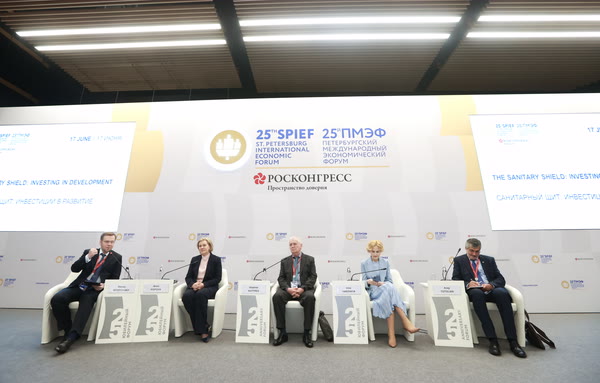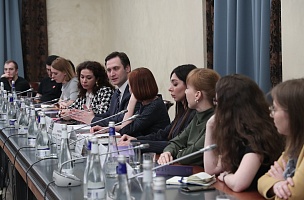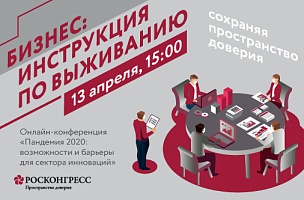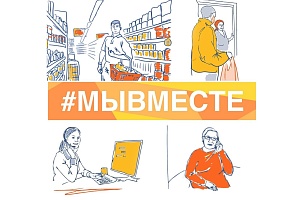Key conclusions
A so-called sanitary shield is being developed in Russia using new technology
“Any threat, and especially a microbiological one <...> can cause huge economic loss if it comes to pass. <...> In order to ensure there’s a vaccine in four months, we need to prepare, and we need vaccine platforms. Some [of which – ed.] we have, some we don’t. But the main thing is the preparedness to scale things up, the preparedness of industry, the preparedness of the Ministry of Industry and Trade of the Russian Federation. And this is also a part of the sanitary shield which is already benefitting from additional development. Today, the main thing for us is to learn all the lessons we can, and evaluate all the tools we now have at our disposal. This also means investment in epidemiological surveillance. Today, we have the skills and knowledge to assemble and disassemble a vaccine. <...> We have broken down all the barriers that existed between government bodies. We have increased the volume of material studied fivefold. <...> We have created a system which [brings a rapid result – ed.] to members of the public. And this is also a new tool – making a PCR test incredibly quick for both the patient, and the doctor. Today it takes just 60 minutes. <...> This is also a new tool which has enabled us to employ digital technology,” Anna Popova, Head of the Federal Service for Surveillance on Consumer Rights Protection and Human Wellbeing – Chief State Sanitary Physician of the Russian Federation.
“We have learned to test people very quickly and set up PCR centres at mobile labs. Our method and approach are unique, and allows us to work anywhere without light, and to do the analyses completely autonomously, solving any problem in the process. All these elements are individual parts of the sanitary shield. The development of these elements today and their introduction into day-to-day life are things which we spoke about in previous years. However, today these objectives have been met, and other objectives will be met too. We need to do this, and do it very quickly,” Anna Popova, Head of the Federal Service for Surveillance on Consumer Rights Protection and Human Wellbeing – Chief State Sanitary Physician of the Russian Federation.
It is important to build the sanitary shield in cooperation with the global community
“Global security will depend on each and every country. That means if each country has a strong system in place <...> we will be able to quickly halt the spread of a microorganism. Of course, not all countries are in a position to be able to do this. It requires economic strength, a foundation, science, expertise, history, and everything else. <...> And the World Health Organization must find new ways of working together – we need to work more closely with the Russian Federation,” Melita Vujnovic, Representative to the Russian Federation, Head of Office, World Health Organization Office in the Russian Federation.
“The sanitary shield is not only about the work done in the Russian Federation. It is a multifaceted endeavour, a professional one, and [would be impossible – ed.] without the creation of three bands which cover neighbouring countries and beyond. <...> Over the past few decades, 40 new infectious diseases have been identified, and were it not for COVID, we would be working on them professionally – fighting them,” Vladimir Kutyrev, Director, Microbe Russian Anti-Plague Scientific Research Institute.
“The sanitary shield is made up of a comprehensive range of measures which should protect the most important thing – people’s lives. <...> If we fail to learn how to foresee the risks and threats, <...> then we should be aware that if an epidemic is introduced in the future, it can in a single moment destroy a country’s entire economy. But most horrific of all is that fact that a huge number of people could perish. Therefore, it would be irresponsible at the very least not to consider the fact that there are two sides to biotechnologies. <...> Biological weapons are the most dangerous weapons imaginable. That’s because the source, the location of the attack will never be clear. The scale will not always be clear either, but there will always be colossal and irreversable consequences. So, there should not be any biological weapons. <...> The main thing is not to allow anyone to create an artificial epidemic or to create an artificial problem for other countries,” Irina Yarovaya, Deputy Chairman of the State Duma of the Federal Assembly of the Russian Federation.
PROBLEMS
It is important to learn how to live in the new reality, with careful use of the internet
“We’ve been talking about ‘the new normal’ since February 2020. It is a new term, and we have to learn how to live in this new world, marked by another level of interaction with the microcosm,” Anna Popova, Head of the Federal Service for Surveillance on Consumer Rights Protection and Human Wellbeing – Chief State Sanitary Physician of the Russian Federation.
“The idea of interacting with the information field is a first for the sanitary shield, and is very important. During the pandemic, we experienced this [format – ed.] for the first time. Back then, we were not aware what it was – a load on the human psyche. We are proud that the Russian Federation has the widest internet coverage, but we must learn to master this tool, or best of all, control it. That’s because we cannot allow a repeat of what happened – this is one of our objectives,” Anna Popova, Head of the Federal Service for Surveillance on Consumer Rights Protection and Human Wellbeing – Chief State Sanitary Physician of the Russian Federation.
“We have changed the world around us. <...> There are incredible levels of migration, incredible levels of air traffic enabling a virus to fly, as happened from Wuhan. There’s also the severe situation regarding climate change, and we need to factor all of these things in and keep them in mind. People have intervened in areas of nature previously untouched by humans, <...> when microorganisms lived their lives. And human involvement in this unfamiliar environment causes [diseases – ed.] to emerge. We need to learn how to live with the microcosm, but only in new conditions. <...> We must do everything so as to not hinder people or the economy, while at the same time protect the health and life of the population,” Anna Popova, Head of the Federal Service for Surveillance on Consumer Rights Protection and Human Wellbeing – Chief State Sanitary Physician of the Russian Federation.
SOLUTIONS
Greater interaction with the public, including efforts to clearly explain the need for people to protect themselves
“The sanitary shield has a material component, but the intangible component is no less important. <...> We need to learn how to speak about complicated things in an accessible way, and work to build trust [with the public – ed.]. <...> We have seen how countries with a high level of interethnic and interpersonal trust are at a much lower risk from the pandemic... We are speaking about a multi‑dimensional shield... And sanitary culture forms an important part,” Larisa Katysheva, Director of the Center for Modern Communications, Higher School of Public Administration, Russian Presidential Academy of National Economy and Public Administration (RANEPA).
Share Russian experience and technology with neighbouring countries
“We used a model incorporating 26 regions to develop [sanitary protection – ed.] technology. The ideas which were put forward by scientific institutions were very quickly put into practice – Rospotrebnadzor’s structure allows for this. We did not stop there, though. The technology provides a toolset for us to work... That’s because sanitary monitoring needs to be an ongoing endeavour. What’s more, this technology has been introduced in neighbouring countries, such as Belarus, Tajikistan, Armenia, and Kyrgyzstan. In fact, this technology was transferred in a short amount of time,” Areg Totolian, Director, Institut Pasteur in St. Petersburg for Research in Epidemiology and Microbiology of the Federal Service for Surveillance on Consumer Rights Protection and Human Wellbeing.
“Having our own modest production facilities enables us to gradually introduce products which have been developed and are coming off the production line. We don’t have to wait for a major business partner to turn up with an interest in large-scale projects,” Areg Totolian, Director, Institut Pasteur in St. Petersburg for Research in Epidemiology and Microbiology of the Federal Service for Surveillance on Consumer Rights Protection and Human Wellbeing.
For more information, visit the Roscongress Foundation’s Information and Analytical System at roscongress.org/en






